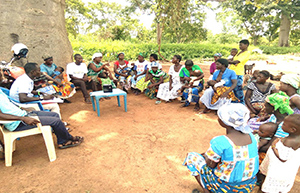Introduction

In Ghana, SPRING has been working in Northern and Upper East Regions where rates of child undernutrition are among the highest in the country. Currently, SPRING’s activities cover 15 districts and 405 communities through partnerships with the Ghana Health Service and other agencies. While the SPRING program addresses the entire community, the focus of action is on 1,000-day households—households with a pregnant or lactating woman or a child under the age of two years. The focus is on these households because the first 1,000 days of a child’s life are the time to prevent undernutrition and ensure healthy growth. Losses during this period cannot be recovered as the child develops.
SPRING works in collaboration with local district assemblies and institutions like the Ghana Health Service, the Ministry of Food and Agricultural, and the Environmental Health Unit, among others, in three broad areas.
- Nutrition, with a focus on improving infant and young child feeding – SPRING works to improve capacity of health facility-based staff and community-based health volunteers to promote and improve infant and young child feeding (IYCF) practices including early introduction and exclusive breastfeeding; timely and appropriate complementary feeding; and effective decision-making through growth chart monitoring and targeted counselling.
- Water, sanitation, and hygiene – SPRING encourages proper hygiene through the promotion of four key water, sanitation, and hygiene behaviours: (1) safe disposal of human and animal feces, (2) clean and safe play spaces for children, (3) safe water consumption through appropriate water treatment including boiling, and (4) handwashing with soap at critical times.
- Agriculture – SPRING’s agriculture focus is limited to reducing aflatoxin exposure through infected groundnuts. Program activities include capacity building for agriculture extension agents to engage farmers through Farmer Field Schools, aflatoxin awareness campaigns, and promoting good agronomic practices to ensure the production of aflatoxin-free groundnuts to increase household income and reduce consumption.
Social and behaviour change communication (SBCC) cuts across all SPRING activities. SPRING uses a variety of communication channels including mass media, interpersonal communication, and community-based platforms to improve access to critical information and to motivate health providers and families to adopt key nutritional practices.
This guide is to be used by community health volunteers to guide mother-to-mother support group (MTMSG) discussions with caregivers of children under 2 years of age. For sessions 3 and 8, please ask a community health worker to help support the discussions and respond to questions about care and services. Please use this guide with the companion communication materials: a radio serial drama entitled “Shrubs that Grow Become Tomorrow’s Forest,” IYCF counselling cards and adapted counselling cards, and short videos. Each session will spark conversation among mothers and caregivers about child undernutrition and motivate them to try good nutritional practices at home. After each session, help members name a behaviour that they will practice at home and then ask them to be prepared to come back and talk about it in the next session.
Using This Guide to Conduct a Mother-to-Mother Support Group Meeting
This guide is designed to be used with a mother-to-mother support group over the course of nine meetings. Each session should last one hour. Sessions may go longer if participants would like.
This guide gives step-by-step instructions for each session, including when to use the communication materials provided by SPRING. The communication materials include:
- the original radio serial drama on infant and young child feeding and hygiene practices—"The Shrubs of Today Become Tomorrow’s Forest" (six episodes);
- infant and young child feeding (IYCF) counselling cards, including adapted counselling cards; and
- four short counselling videos on breastfeeding and complementary feeding practices.
Make sure you have received the package of these materials from SPRING and that you are familiar with them before you start your sessions. The IYCF counselling cards may be accessed at the local health facility or online.
Remember, if you choose to play one of the radio episodes, you will need to have a radio player available and be in a meeting location where everyone can hear the episode clearly.
Use the materials during the sessions. They help to make the session more lively and interesting.
The main goals of these sessions are to get participants to try recommended behaviours at home and to recollect information or a process of performing a specific task related to IYCF. At the end of each session, ask for volunteers to try some of the behaviours that you talked about. In the next meeting, let participants talk about their experiences. If they had challenges, let the group help them find ways to address the problems. Also help them celebrate what worked!